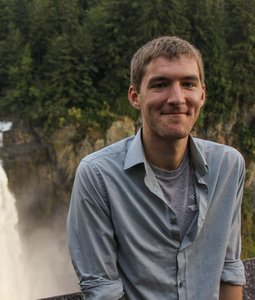ESP Biography
RYAN LINEHAN, Stanford Physics Graduate Student
|
Major: Physics College/Employer: Stanford Year of Graduation: 2021 |

|
Brief Biographical Sketch:
I am a student and sharer of physics. My undergraduate work at Boston University and my current graduate work at Stanford University have helped me to understand some of nature's hidden beauty so that I can share it with others. My favorite sub-fields of physics are particle and astroparticle physics, which examine the behaviors of the smallest bits of matter. Between my undergraduate and graduate careers, I've worked with both neutrino physics experiments and dark matter detection experiments. I'm currently working with the LZ experiment at SLAC. When it turns on in 2020, it will search for WIMPs, which are a specific class of dark matter candidates. Past Classes(Clicking a class title will bring you to the course's section of the corresponding course catalog)C6721: An Introduction to Experimental Particle Physics in Splash Fall 2018 (Dec. 01 - 02, 2018)
All of matter is made from elementary particles that are smaller than atoms. But wait, if these particles are so small, how can we possibly study them?
This class is an introduction to how physicists detect and study subatomic and elementary particles. We'll first discuss some properties of different subatomic particles and how they interact with each other. Following that, we'll use the LArIAT detector at Fermilab as a case study of detector techniques and technology.
All high-school ages and above welcome.
C6423: An Introduction to Experimental Particle Physics in Splash Spring 2018 (May. 05 - 06, 2018)
All of matter is made from elementary particles that are smaller than atoms. But wait, if these particles are so small, how can we possibly study them?
This class is an introduction to how physicists detect and study subatomic and elementary particles. We'll first discuss some properties of different subatomic particles and how they interact with each other. Following that, we'll use the LArIAT detector at Fermilab as a case study of detector techniques and technology.
M6431: How to Make a Video Game in Splash Spring 2018 (May. 05 - 06, 2018)
Ever wondered what it takes to build a video game from the ground up? Yeah, it may take some coding experience, but building a game involves far more than that. Come listen to us talk about how to brainstorm, design, code, and redesign video games. We'll use our own video game, Meteor Shower, as a case study of what to do (and what NOT to do) when you're looking down the road of game development.
C5958: An Introduction to Experimental Particle Physics in Splash Fall 2017 (Nov. 11 - 12, 2017)
All of matter is made from elementary particles that are smaller than atoms. But wait, if these particles are so small, how can we possibly study them?
This class is an introduction to how physicists detect and study subatomic and elementary particles. We'll first discuss some properties of different subatomic particles and how they interact with each other. Following that, we'll use the LArIAT detector at Fermilab as a case study of detector techniques and technology.
C5552: An Introduction to Experimental Particle Physics in Splash Spring 2017 (Apr. 22 - 23, 2017)
All of matter is made from elementary particles that are smaller than atoms. But wait, if these particles are so small, how can we possibly study them?
This class is an introduction to how physicists detect and study subatomic and elementary particles. We'll first discuss some properties of different subatomic particles and how they interact with each other. Following that, we'll use the LArIAT detector at Fermilab as a case study of detector techniques and technology.
|
|
